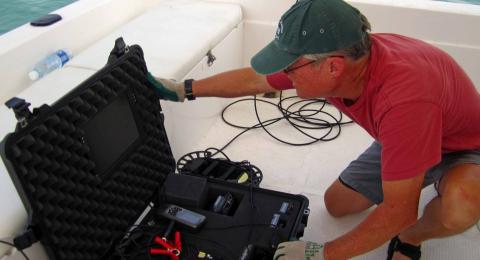The School of Marine Science and Ocean Engineering (SMSOE) is the University of New Hampshire’s first interdisciplinary school, designed to address today’s highly complex ocean and coastal challenges through integrated graduate education, research and engagement. As such, it serves as an interdisciplinary nexus for marine science and ocean engineering teaching and research across the University.

Looking for delicious and locally-raised seafood? Help support our Center for Sustainable Seafood Systems by purchasing smoked Steelhead trout from our offshore aquaculture training platform! Our responsibly-grown trout are raised offshore with blue mussels and sugar kelp in UNH's multi-trophic AquaFort and smoked by Boston Smoked Fish Co. with a mouthwatering mixture of brown sugar, tamari, salt, and other spices.
Orders can be placed below and picked up at Jere A. Chase Ocean Engineering Lab in Durham, NH or the Judd Gregg Marine Research Complex in New Castle, NH. Thank you for your support!
Recent Stories

How Would Reduced Indirect Costs Affect UNH Research?
How Would Reduced Indirect Costs Affect UNH Research?
Marian McCord explains the implications of proposed changes
Article
UNH Ocean Engineering Student Earns Prestigious DOD SMART Scholarship

UNH Partnership Helping NH High Schoolers Build and Race Submarines
UNH Partnership Helping NH High Schoolers Build and Race Submarines
President Chilton visits Sanborn Regional High School to celebrate growing collaboration
ArticleUpcoming Events
-
Jul208:30 a.m. - 3 p.m.
-
Jul238:30 a.m. - 3 p.m.
-
Jul298:30 a.m. - 3 p.m.
UNH Land Acknowledgement
As we all journey on the trail of life, we wish to acknowledge the spiritual and physical connection the Pennacook, Abenaki, and Wabanaki Peoples have maintained to N’dakinna (homeland) and the aki (land), nebi (water), olakwika (flora), and awaasak (fauna) which the University of New Hampshire community is honored to steward today. We also acknowledge the hardships they continue to endure after the loss of unceded homelands and champion the university’s responsibility to foster relationships and opportunities that strengthen the well-being of the Indigenous People who carry forward the traditions of their ancestors.








